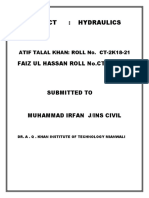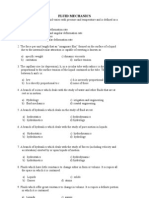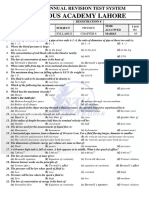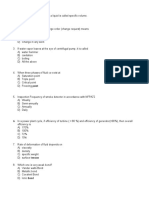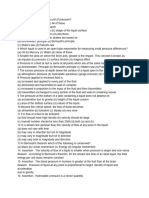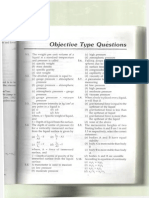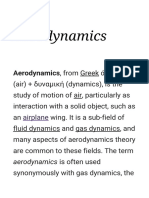0 ratings0% found this document useful (0 votes)
31 views2001 - Fluid Mechanics
2001 - Fluid Mechanics
Uploaded by
Chilvin ChipmunkThis document contains 50 multiple choice questions testing knowledge of fluid mechanics principles and terminology. The questions cover topics such as hydrostatic pressure, viscosity, fluid flow regimes, continuity equations, buoyancy, turbines, manometers, and more. For each question, the test-taker must select the best answer choice among 4 options to complete the statement or answer the question.
Copyright:
© All Rights Reserved
Available Formats
Download as PDF, TXT or read online from Scribd
2001 - Fluid Mechanics
2001 - Fluid Mechanics
Uploaded by
Chilvin Chipmunk0 ratings0% found this document useful (0 votes)
31 views11 pagesThis document contains 50 multiple choice questions testing knowledge of fluid mechanics principles and terminology. The questions cover topics such as hydrostatic pressure, viscosity, fluid flow regimes, continuity equations, buoyancy, turbines, manometers, and more. For each question, the test-taker must select the best answer choice among 4 options to complete the statement or answer the question.
Original Description:
Copyright
© © All Rights Reserved
Available Formats
PDF, TXT or read online from Scribd
Share this document
Did you find this document useful?
Is this content inappropriate?
This document contains 50 multiple choice questions testing knowledge of fluid mechanics principles and terminology. The questions cover topics such as hydrostatic pressure, viscosity, fluid flow regimes, continuity equations, buoyancy, turbines, manometers, and more. For each question, the test-taker must select the best answer choice among 4 options to complete the statement or answer the question.
Copyright:
© All Rights Reserved
Available Formats
Download as PDF, TXT or read online from Scribd
Download as pdf or txt
0 ratings0% found this document useful (0 votes)
31 views11 pages2001 - Fluid Mechanics
2001 - Fluid Mechanics
Uploaded by
Chilvin ChipmunkThis document contains 50 multiple choice questions testing knowledge of fluid mechanics principles and terminology. The questions cover topics such as hydrostatic pressure, viscosity, fluid flow regimes, continuity equations, buoyancy, turbines, manometers, and more. For each question, the test-taker must select the best answer choice among 4 options to complete the statement or answer the question.
Copyright:
© All Rights Reserved
Available Formats
Download as PDF, TXT or read online from Scribd
Download as pdf or txt
You are on page 1of 11
1. What do you call the pressure which the fluid exerts on an immersed object or container walls?
(a) Gage pressure
(b) Hydrostatic pressure
(c) Standard liquid pressure
(d) Normal pressure
2. Viscosity for a fluid is define as the constant of proportionality between shear stress and what other variable?
(a) The spatial derivative of density
(b) The spatial derivative of velocity
(c) The time derivative of density
(d) The time derivative of pressure
3. What is the classification of the fluid flow if the fluid travels parallel to the adjacent layers and the paths of the
individual particles do not cross each other?
(a) Steady flow
(b) Laminar flow
(c) Turbulent flow
(d) Uniform flow
4. Which of the following refers to the measure of a fluid's sensitivity to changes in viscosity with changes in
temperature?
(a) Viscosity factor
(b) Viscosity ratio
(c) Coefficient of viscosity
(d) Viscosity index
5. If the Mach number is greater than 1 but lesser than 5, what is the standard classification of the travel?
(a) Subsonic travel
(b) Supersonic travel
(c) Transonic travel
(d) Hypersonic travel
6. What is measured by a Pitot tube?
(a) Mass flow
(b) Volumetric discharge
(c) Pressure
(d) Velocity
7. Which of the following statements characterized the laminar flow?
I. The velocity is zero at the pipe wall
II. The velocity is minimum at the center
III. The velocity distribution is circular
(a) II only
(b) I and II only
(c) I only
(d) I, II and III
8. In tubes having very small diameters, liquids are observed to rise or fall
relative to the level of the surrounding liquid. What do you call this phenomenon?
(a) Fluidity
(b) Surface tension
(c) Viscosity
(d) Capillarity
9. The continuity equation of fluid flow is applicable to which of the following conditions?
I. The flow of fluid is one dimensional
II. The flow of fluid is steady III. The velocity of the flow is uniform over the cross section
(a) I, II and III
(b) I and II only
(c) I only
(d) II and III only
10. Which of the following statements is NOT correct?
(a) Steady flow do not change with time at any point
(b) For a fluid at rest, the pressure is equal in all directions
(c) Bernoulli's equation only holds on the same streamline
(d) The Reynolds number is the ratio of the viscous force to the inertial force
11. Which of the following describes the continuity equation of an ideal fluid flow?
I. The net rate of flow into any small volume must be zero
II. The energy remains constant along the streamline
II. The energy is constant anywhere in the fluid
(a) I, II and III
(b) I and II only
(c) I only
(d) ll only
12. On a stationary floating object, the buoyant force acts upward through the centroid of the displaced volume.
What do you call this centroid?
(a) Center of buoyancy
(b) Center of volume
(c) Center of pressure
(d) Center of mass
13. In an orifice, what do you call the product of the coefficients of velocity
and contraction?
(a) Vena contracta
(b) Effective head
(c) Theoretical discharge
(d) Coefficient of discharge
14. This principle states that where the velocity of a fluid is high, the pressure is low, and where the velocity is
low, the pressure is high.
Which one?
(a) Stoke's principle
(b) Bernoulli's principle
(c) Torricelli's principle
(d) Archimedes principle
15. If the water of a turbine moves along the vanes towards the axis of of the runner, what is the classification of
the said turbine?
(a) Parallel flow turbine
(b) Axial flow turbine
(c) Radial flow turbine
(d) Mixed flow turbine
16. Viscosities can change with time assuming all other conditions to be constant. If viscosities increases with time
up to a finite value how do you call the fluid?
(a) Thixotropic fluid
(b) Pseudoplastic fluid
(c) Rheopectic fluid
(d) Colloidal fluid
17. The negative sign for a gage reading is called
(a) transmission of pressure
(b) vacuum pressure
(c) pressure head
(d) vapor pressure
18. What do you call the volume occupied by a unit mass of fluid?
(a) Specific gravity
(b) Density
(c) Specific weight
(d) Specific volume
19. This type of turbine has the water entering the runner possessing kinetic energy as well as pressure. Which
one?
I. Reaction type
II. Impulse type
III. Propeller type
(a) I, II and III
(b) II only
(c) III only
(d) I only
20. Which of the following fluids exhibit viscosities that increase with
increasing agitation but they return rapidly to their normal viscosity after
the agitation ceases?
(a) Bingham fluids
(b) Pseudoplastic fluids
(c) Newtonian fluids
(d) Dilatant fluids
21. In hydraulic machines, what is the head required to overcome resistance to flow in pipe, fittings, valves
entrances and exits?
(a) Static suction head
(b) Velocity head
(c) Static discharge head
(d) Friction head
22. What device is used to protect the pipe line from bursting due to pressure rise when the water in the pipe
line is brought to rest?
(a) Surge tank
(b) Sluice gate
(c) Float
(d) Check valve
23. According to Archimedes' principle, the buoyant force on a submerged object is equal to which of the
following?
(a) Weight of the fluid not being displaced
(b) Weight of the fluid displaced and the total weight of the object
(c) Weight of the displaced fluid
(d) Weight of the object above the fluid surface
24. Which of the following refers to the measure of the fluid's resistance to
flow when acted upon by an external force?
(a) Coefficient of resistance
(b) Specific volume
(c) Specific gravity
(d) Viscosity
25. What do you call the input power delivered by the motor to the pump?
(a) Nameplate power
(b) Effective power
(c) Brake horsepower
(d) Hydraulic power
26. If one end of the manometer opens to the air, what do you call this
manometer?
(a) Free end manometer
(b) Differential manometer
(c) Continuous manometer
(d) Open manometer
27. An instrument use to measure small pressure.
(a) Orifice
(b) Aneroid
(c) Venturi
(d) Manometer
28. Which of the following ratios describes Reynolds number?
(a) Viscous forces / Drag forces
(b) Inertial forces / Viscous forces
(c) Drag forces/Buoyant forces
(d) Buoyant forces / Inertial forces
29. The following valves are used for shut-off services. Which one is NOT
included?
(a) Butterfly valve
(b) Ball valve
(c) Gate valve
(d) Plug cock
30. Which of the following statements is TRUE about a fluid?
(a) It is a liquid only
(b) It cannot sustain a shear force at rest
(c) It can strain
(d) It has a very regular molecular structure
31. The speed at which the fluid escapes form a container through an orifice is described by which of the
following theorems?
(a) Archimedes theorem
(b) Ptolemy's theorem
(c) Torrecelli's theorem
(d) Bernoulli's theorem
32. What do you call the vertical distance above the centerline of the pump inlet to the free level of the fluid
source?
(a) Velocity head
(b) Friction head
(c) Static suction head
(d) Static discharge head
33. Which of the following is an example of a Newtonian fluid?
(a) Motor oils
(b) Clay slurries
(c) Gas
(d) Paints
34. An instrument which is used to determine the specific gravity of a
substance?
(a) None of these
(b) Throttling calorimeter
(c) Odometer
(d) Hydrometer
35. A mass of fluid at a high elevation will have more energy than an identical mass of fluid at a lower elevation.
What do you call their energy difference?
(a) Hydrostatic energy
(b) Stagnation energy
(c) Pressure energy
(d) Potential energy
36. The following are the basic components of a fluid element in motion. Which one is NOT included?
(a) Rotation
(b) Twist
(c) Volume distortion
(d) Translation
37. What is the ratio of the object's speed to the speed of sound in the medium through which it is traveling?
(a) Subsonic travel
(b) Decibel
(c) Hypersonic travel
(d) Mach number
38. In an orifice, what is the ratio of the area of the vena contracta to the orifice area?
(a) Torricelli's coefficient
(b) Coefficient of contraction
(c) Coefficient of discharge
(d) Coefficient of velocity
39. Which of the following fluid flow is characterized by erratic, small whirlpool-like circles?
(a) Steady flow
(b) Turbulent flow
(c) Uniform flow
(d) Laminar flow
40. If the Reynolds number is less than 2100, what is the classification of the fluid flow?
(a) Turbulent flow
(b) Laminar flow
(c) Critical flow
(d) Uniform flow
41. Which of the following turbines are generally employed where the available head is small, typically below 600
to 800 ft?
(a) Reaction turbine
(b) Impulse turbine
(c) Francis turbine
(d) Propeller type turbine
42. Which of the following is assumed in Bernoulli's equation?
1. There is no fluid friction
II. The fluid is incompressible
III. Changes in thermal energy are negligible
(a) I and II only
(b) I, II and III
(c) I and III only
(d) I only
43. A hydrometer scale for measuring the relative density (specific gravity) of liquids
(a) Baume scale
(b) Beaufort scale
(c) Buckley scale
(d) Beckman scale
44. After the water passes through the turbine in a hydroelectric plant, it is discharged through the draft tube
to the receiveing reservoir. What do you call this reservoir?
(a) Exhaust water
(b) Headwater
(c) Forebay
(d) Tailwater
45. It refers to the fractional change in the volume of a fluid per unit change in pressure in a constant
temperature process. Which one?
(a) Compressibility
(b) Proportional limit
(c) Capillarity
(d) Bulk modulus
46. Which of the following refers to velocity head?
(a) Pressure head
(b) Energy head
(c) Friction head
(d) Flow head
47. This law states that the pressure applied at any point of a confined fluid is transmitted equally to all other
points. What law is this?
(a) Pascal's law
(b) Charles' law
(c) Boyle's law
(d) Newton's law
48. In a floating object, what do you call the distance between the center of gravity and the metacenter?"
(a) Buoyancy head
(b) Metacenteric height
(c) Metacentric head
(d) Submerged height
49. If the Mach number is lesser than 1, what is the standard classification
of the travel?
(a) Hypersonic travel
(b) Transonic travel
(c) Supersonic travel
(d) Subsonic travel
50. When a fluid flows through a pipe of cross sectional area A and a velocity V, the flow or discharge is
(a) AV
(b) AV^2
(c) A²/2V
(d) AV^2v
51. What is a check valve?
(a) A valve designed to release the excess pressure
(b) A valve that allows the fluid to flow in either direction
(c) A valve used to check the pressure of fluid
(d) A valve designed to allow the fluid to flow in one direction only
52. This tube is bent or curved and carries fluid from one container at a high elevation to another container at a
lower elevation. Which one?
(a) Pitot tube
(b) Siphon
(c) Impact tube
(d) Venturi tube
53. In the operation of this pump, liquid flowing into the suction side is captured by the impeller and thrown to
the outside of the pump casing. What is this pump called?
(a) Jet pump
(b) Ejector pump
(c) Power pump
(d) Centrifugal pump
54. What do you call the travel in the transition region between subsonic and supersonic travels?
(a) Hypersonic travel
(b) Shock wave
(c) Sonic boom
(d) Transonic travel
55. What is the classification of the fluid flow if at any instant of time the number of particles passing every
cross section of the stream is the same?
(a) Uniform flow
(b) Continuous flow
(c) Dynamic flow
(d) Steady flow
56. What is the reciprocal of absolute viscosity?
(a) Viscosity gradient
(b) Fluidity
(c) Compressibility
(d) Viscosity index
57. The following statements must be satisfied by the flow of any fluid Which one is NOT included?
(a) Newton's law of viscosity
(b) The principle of conservation of energy
(c) The continuity equation
(d) Newton's second law of motion
58. What do you call the volume of fluid passing a cross section of stream per unit of time?
(a) Specific volume
(b) Continuous flow
(c) Steady flow
(d) Discharge
59. Which of the following fluids exhibit viscosities that decrease with an increasing velocity gradient?
(a) Newtonian fluids
(b) Dilatant fluids
(c) Bingham fluids
(d) Pseudoplastic fluids
60. What do you call the pressure measured with respect to a true zero pressure reference?
(a) Absolute pressure
(b) Atmospheric pressure
(c) Meter pressure
(d) Gage pressure
61. Which of the following statements is TRUE about a siphon?
I. Operation of a siphon is essentially independent of
atmospheric pressure
II. The ideal discharge is the same
III. Starting a siphon requires the tube to be completely filled with
liquid
(a) I, II and Ill
(b) I and II only
(c) Il and Ill only
(d) Ill only
62. Viscosities can change with time assuming all other conditions to be constant. If viscosities decrease with
time, what do you call the fluid?
(a) Rheopectic fluid
(b) Colloidal fluid
(c) Thixotropic fluid
(d) Pseudoplastic fluid
63. What is the name of the pipe that conducts water to the turbine in a hydroelectric plant?
(a) Penstock
(b) Forebay
(c) Runner
(d) Tailrace
64. What do you call the manometer if both ends are connected to pressure
sources?
(a) Differential manometer
(b) Open manometer
(c) Distributive manometer
(d) Cumulative manometer
65. If the water of a turbine flows parallel towards the axis of rotation from
the runner, what is the classification of the said turbine?
(a) Mixed flow turbine
(b) Axial flow turbine
(c) Radial flow turbine
(d) Inward flow turbine
66. Which of the following adds energy to the fluid flowing through it?
(a) Sink
(b) Pump
(c) Pipe
(d) Turbine
67. Which of the following statements describe the fluid, if the shear stress of the fluid varies linearly with the
velocity gradient?
(a) It has a constant viscosity
(b) It is a Newtonian fluid
(c) It has a constant temperature
(d) All of these
68. Which of the following is a dimensionless ratio of a fluid's density to
some standard reference density?
(a) Specific gravity
(b) Specific weight
(c) Coefficient of resistance
(d) Specific volume
69. Summation of all heads in another section.
(a) Bernoulli's principle
(b) Boyle's law
(c) Archimedes principle
(d) Torricelli's principle
70. Which of the following refers to a water path usually a large diameter pipe used to channel water around or
through an obstructing feature?
(a) Canal
(b) Culvert
(c) Siphon
(d) Reservoir
71. Poise is a unit of viscosity derived from which of the following?
(a) pound-second per square foot
(b) gram-second per square centimeter
(c) dyne-second per square centimeter
(d) slugs-second per square foot
72. What is the velocity of a fluid particle at the center of the pipe?
(a) Minimum
(b) Maximum
(c) Between minimum and maximum
(d) Zero
73. It refers to weight of the fluid per unit volume. Which one?
(a) Gravitational acceleration
(b) Absolute weight
(c) Mass
(d) Specific weight
74. Bernoulli's law for fluid flow is based on which of the following principles?
(a) Newton's second law of motion
(b) Conservation of energy
(c) Continuity equation
(d) Conservation of mass
75. Which of the following is NOT a reaction turbine?
(a) Kaplan turbine
(b) Pelton wheel turbine
(c) Thomson turbine
(d) Francis turbine
76. Which of the following is an empirical factor that accounts for the friction and turbulence at the orifice?
(a) Coefficient of velocity
(b) Coefficient of discharge
(c) Coefficient of friction
(d) Coefficient of contraction
77. What do you call the difference between the brake and hydraulic powers in a pump?
(a) Friction power
(b) Discharge power
(c) Suction power
(d) Water power
78. How do you classify liquids that vaporized easily?
(a) Osmotic liquid
(b) Ideal liquid
(c) Saturated liquid
(d) Volatile liquid
79. A load from a faucet comes out in separate drops. Which of the following is the main cause of this
phenomenon?
(a) Air tension
(b) Viscosity of the fluid
(c) Gravity
(d) Surface tension
80. Which of the following is a force multiplying device using pressurized fluid?
(a) Hydraulic ram
(b) Differential manometer
(c) Pneumatic relay
(d) Plunger
81. This turbine consists of a rotating shaft called turbine runner on which buckets or blades are mounted. What
is the name of this turbine?
(a) Reaction turbine
(b) Francis turbine
(c) Axal flow turbine
(d) Impulse turbine
82. The following valves are used for throttle services. Which one is NOT included?
(a) Butterfly valve
(b) Check valve
(c) Angle valve
(d) Globe valve
83. Which of the following principles state that pressure applied to a confined fluid increases the pressure
throughout by the same amount?
(a) Pascal's principle
(b) Torricelli's principle
(c) Archimedes' principle
(d) Bernoulli's principle
84. If the Mach number is greater than 5, what is the standard classification
of the travel?
(a) Supersonic travel
(b) Transonic travel
(c) Hypersonic travel
(d) Subsonic travel
85. Total energy in a compressible or incompressible fluid flowing across any section in a pipeline is a function of
(a) pressure and velocity
(b) flow energy, kinetic energy, height above datum & internal energy
(c) pressure, density and velocity
(d) pressure, velocity, density and velocity
86. To determine the frictional energy loss for fluids experiencing laminar flow, this equation is used. Which one?
(a) Maxwell's equation
(b) Darcy equation
(c) Bernoulli's equation
(d) Hazen-Williams equation
87. Which of the following is TRUE about shear stress in a moving fluid?
I. It is proportional to the fluid density
II. It is proportional to the velocity gradient at the point of interest
III. It is proportional to the square of the flow
(a) I, II and III
(b) I only
(c) II only.
(d) I and II only
88. In an orifice, what is the ratio of the actual velocity of discharge to the theoretical velocity of discharge?
(a) Coefficient of utilization
(b) Coefficient of discharge
(c) Coefficient of velocity
(d) Velocity factor
89. If the Reynolds number is less than 4000, what is the classification of the fluid flow?
(a) Turbulent flow
(b) Critical flow
(c) Laminar flow
(d) Uniform flow
90. What do you call the vertical distance above the centerline of the pump inlet to the point of free discharge
level of the discharge tank?
(a) Static discharge head
(b) Velocity head
(c) Static suction head
(d) Elevation head
91. Which of the following devices is used for measuring the absolute pressure of the atmosphere?
(a) Barometer
(b) Manometer
(c) Bolometer
(d) Venturi tube
92. For partially submerged objects to be stable, where does the metacenter be located?
(a) To the left of the center of gravity
(b) Above the center of gravity
(c) Below the center of gravity
(d) To the right of the center of gravity
93. A mass of fluid at a higher pressure will have more energy than an identical mass of fluid at a lower pressure.
What do you call their energy difference?
(a) Hydrostatic energy
(b) Energy drop.
(c) Pressure energy
(d) Energy gap
94. What is referred to as friction within a fluid that prevents the fluid from flowing freely?
(a) Gradient
(b) Fluidity
(c) Adhesion
(d) Viscosity
95. If the water of a turbine enters radially inward at the inlet and is discharges at the outlet in a direction
parallel to the axis of rotation of the runner, what is the classification of the said turbine?
(a) Radial flow turbine:
(b) Axial flow turbine
(c) Mixed flow turbine
(d) Inward flow turbine
96. Which of the following turbines are generally employed where the available head is very high, typically above
800 to 1600 ft?
(a) Propeller type turbine
(b) Reaction turbine
(c) Francis turbine
(d) Impulse turbine
97. Absolute viscosity of a fluid varies with the pressure and temperature and is defined as a function of
(a) density and shear stress
(b) density, shear stress and angular deformation rate
(c) shear stress and angular deformation
(d) density and angular deformation rate
98. If the Reynolds number is between 2100 and 4000, what is the classification of the fluid flow?
(a) Turbulent flow
(b) Uniform flow
(c) Critical flow
(d) Laminar flow
99. What do you call the power required to deliver a given quantity of fluid against a given head with no losses in
the pump?
(a) Wheel power
(b) Specific power
(c) Hydraulic power
(d) Brake power
100. The conservation of energy equation used in any fluid analysis is base on which of the following laws?
(a) First law of Thermodynamics
(b) Second law of Thermodynamics
(c) Newton's second law of motion
(d) Coulomb's first law of electrostatics
You might also like
- Subject: Hydraulics: Faiz Ul Hassan Roll No - Ct-2K18-16Document13 pagesSubject: Hydraulics: Faiz Ul Hassan Roll No - Ct-2K18-16Eng Zeeshan TariqNo ratings yet
- Unit - III Flow With Normal Shock WavesDocument26 pagesUnit - III Flow With Normal Shock WavesMuthuvel M100% (1)
- 2001 ESAS - Fluid MechanicsDocument11 pages2001 ESAS - Fluid MechanicsChilvin ChipmunkNo ratings yet
- FLUID MECHANICS Reviewer For Finals (Answer)Document21 pagesFLUID MECHANICS Reviewer For Finals (Answer)keyaru donoNo ratings yet
- Sample Questions Fluid MechanicsDocument10 pagesSample Questions Fluid MechanicsjrmmansayonNo ratings yet
- Mechanical Engineering Important MCQ PDF-Fluid Mechanics 3Document25 pagesMechanical Engineering Important MCQ PDF-Fluid Mechanics 3Bala MetturNo ratings yet
- All Units - MCQDocument47 pagesAll Units - MCQPrasanth S Assistant ProfessorNo ratings yet
- 1Document13 pages1Terry MilesNo ratings yet
- Industrial/Power Plant Engineering: Prepared By: Engr. Jose R. FranciscoDocument12 pagesIndustrial/Power Plant Engineering: Prepared By: Engr. Jose R. FranciscoINSTRUCAL CALIBRATION SERVICESNo ratings yet
- FM MCQ Question BankDocument2 pagesFM MCQ Question BankGgfgNo ratings yet
- Industrial/Power Plant Engineering: Prepared By: Engr. Jose R. FranciscoDocument6 pagesIndustrial/Power Plant Engineering: Prepared By: Engr. Jose R. FranciscoJerick HernandezNo ratings yet
- Mechanical Engineering Important MCQ PDF-Fluid MechanicsDocument9 pagesMechanical Engineering Important MCQ PDF-Fluid Mechanicskibrom atsbhaNo ratings yet
- 7 Set (Green International)Document22 pages7 Set (Green International)GEO MERINNo ratings yet
- Fluid Mechanics and Hydraulics QuestionsDocument51 pagesFluid Mechanics and Hydraulics QuestionsBhagath J PrakashNo ratings yet
- Ambitious Academy Lahore: Annual Revision Test SystemDocument2 pagesAmbitious Academy Lahore: Annual Revision Test SystemAmir HabibNo ratings yet
- IES 2005 - I ScanDocument25 pagesIES 2005 - I ScanK.v.SinghNo ratings yet
- FM & FM Lab MCQDocument11 pagesFM & FM Lab MCQrajmehaNo ratings yet
- Fluid Mechanics Objective Questions For Mechanical EngineeringDocument5 pagesFluid Mechanics Objective Questions For Mechanical Engineeringrashik072No ratings yet
- Fluid Mechanics Professor: Salvador Vargas Díaz Final Theoretical Quiz Student NameDocument6 pagesFluid Mechanics Professor: Salvador Vargas Díaz Final Theoretical Quiz Student NameSALVADOR VARGAS DIAZNo ratings yet
- Must Read ONGC Fluid Mechanics Questions With AnswersDocument5 pagesMust Read ONGC Fluid Mechanics Questions With AnswersIgbereyivwe TejiriNo ratings yet
- Unit operations-II Question BankDocument6 pagesUnit operations-II Question Bankvasundara606No ratings yet
- Exam 1Document3 pagesExam 1Shubh RNo ratings yet
- Chapter 6 Mcqs Fluid DynamicsDocument5 pagesChapter 6 Mcqs Fluid Dynamicsleen praslaNo ratings yet
- Civil Engineering-Fluid Mechanics MCQ PDF: All Exam Review AddaDocument16 pagesCivil Engineering-Fluid Mechanics MCQ PDF: All Exam Review AddaSarang TidkeNo ratings yet
- fbfa34e0a639cade58ee3a4d93674b68Document3 pagesfbfa34e0a639cade58ee3a4d93674b6811.vega.tos2No ratings yet
- 300 Top Fluid Mechanics Multiple Choice Questions With Answers PDFDocument20 pages300 Top Fluid Mechanics Multiple Choice Questions With Answers PDFpiluNo ratings yet
- Civil Engineering Important MCQ PDF-Hydraulics and Fluid Mechanics Part 3 - WWW - ALLEXAMREVIEW.COMDocument10 pagesCivil Engineering Important MCQ PDF-Hydraulics and Fluid Mechanics Part 3 - WWW - ALLEXAMREVIEW.COMMuhammad WaqarNo ratings yet
- Examenpreguntas Solucion 1bim Mec Fluidos I Mec4g4 GR2 PDFDocument3 pagesExamenpreguntas Solucion 1bim Mec Fluidos I Mec4g4 GR2 PDFomar pillajoNo ratings yet
- Fluid Mechanics Problems Quiz Multiple Choice Questions Download FreeDocument21 pagesFluid Mechanics Problems Quiz Multiple Choice Questions Download Freeahmish kabbaxe100% (1)
- Multiple Choice Questions (Hydraulic and Pneumatic Drives & Lubrication)Document7 pagesMultiple Choice Questions (Hydraulic and Pneumatic Drives & Lubrication)mayilNo ratings yet
- 11th Physics Ch-9 - Mechanical Properties of Fluids (SQP) 2023-24Document11 pages11th Physics Ch-9 - Mechanical Properties of Fluids (SQP) 2023-24Mahalaksshmi .DNo ratings yet
- Review in FluidsDocument2 pagesReview in FluidsAnalie Marie Alarcon MagallanesNo ratings yet
- Hydraulics and Fluid MechanicsDocument26 pagesHydraulics and Fluid MechanicsSubbaReddyNo ratings yet
- UPSC Chemical Engineering Fluid Mechanics Multiple Choice Objective Type Questions With AnswersDocument14 pagesUPSC Chemical Engineering Fluid Mechanics Multiple Choice Objective Type Questions With AnswersGerry Lou QuilesNo ratings yet
- Abubeker Abrar HolisticDocument18 pagesAbubeker Abrar Holisticbeser 37No ratings yet
- SET31Practice TestDocument25 pagesSET31Practice TestMehrozNo ratings yet
- Apps FMM Question PaperDocument4 pagesApps FMM Question PapertagoreboopathyNo ratings yet
- HMT Unit 3 MCQsDocument10 pagesHMT Unit 3 MCQsSatish kumar patleNo ratings yet
- Upsc Chemical Engineering Fluid Mechanics Multiple Choice Objective Type Questions With AnswersDocument14 pagesUpsc Chemical Engineering Fluid Mechanics Multiple Choice Objective Type Questions With AnswersFrancess CastanedaNo ratings yet
- FMHM MCQDocument11 pagesFMHM MCQPriyanka PanditNo ratings yet
- Document 3Document36 pagesDocument 3kienaberekaladatNo ratings yet
- Multiple Choice Questions FMDocument11 pagesMultiple Choice Questions FMBala MetturNo ratings yet
- QB-fluid Mechanics PDFDocument19 pagesQB-fluid Mechanics PDFprashantyadav98No ratings yet
- CH # 6 (Fluid Dynamics) - Physics 11 (TC)Document4 pagesCH # 6 (Fluid Dynamics) - Physics 11 (TC)Malik Rashid Ali LangrialNo ratings yet
- Solved Chap 6 1st Year Physics MCQsDocument3 pagesSolved Chap 6 1st Year Physics MCQsAmna ShakeelNo ratings yet
- Physics TheoryDocument5 pagesPhysics Theorya22229No ratings yet
- QB FMDocument1 pageQB FMAnil ChauvanNo ratings yet
- FLUID MECHANICS Multiple Choice QuestionsDocument8 pagesFLUID MECHANICS Multiple Choice QuestionsleGion0% (1)
- Mechanical Engineering Important MCQ PDF-Fluid Mechanics 1Document8 pagesMechanical Engineering Important MCQ PDF-Fluid Mechanics 1kibrom atsbhaNo ratings yet
- Solved MCQs 6Document3 pagesSolved MCQs 6bala hatunNo ratings yet
- Mechanical Properties Entrance Question BankDocument11 pagesMechanical Properties Entrance Question BankRockstarNo ratings yet
- Chapter 6first YearDocument7 pagesChapter 6first Yearking manNo ratings yet
- Ad1 MCQDocument11 pagesAd1 MCQYashwanth Srinivasa100% (1)
- Mea Engineering College: Department of Civil Erngineering Fluid Mechanics-IDocument5 pagesMea Engineering College: Department of Civil Erngineering Fluid Mechanics-IShilji 616004No ratings yet
- Exam 2Document3 pagesExam 2Shubh RNo ratings yet
- Turbomachinery Exit Exam TutorialsDocument22 pagesTurbomachinery Exit Exam TutorialsteddiyfentawNo ratings yet
- Mechanical Engineering Important MCQ PDF-Fluid Mechanics 2Document8 pagesMechanical Engineering Important MCQ PDF-Fluid Mechanics 2kibrom atsbhaNo ratings yet
- Mechanical Engineering Important MCQ PDF-Fluid Mechanics 2 PDFDocument8 pagesMechanical Engineering Important MCQ PDF-Fluid Mechanics 2 PDFavantgarde bwoyNo ratings yet
- Chapter 9 Hydroelectric PowerplantDocument15 pagesChapter 9 Hydroelectric PowerplantBaby DarylNo ratings yet
- Fluid Mechanics MCQDocument103 pagesFluid Mechanics MCQAbhijath SVNo ratings yet
- 2001 - Mechanics PTDocument10 pages2001 - Mechanics PTChilvin ChipmunkNo ratings yet
- 2001 Objectives (Eng Materials) 101-200Document10 pages2001 Objectives (Eng Materials) 101-200Chilvin ChipmunkNo ratings yet
- 2001 - Computer Fundamentals 3Document5 pages2001 - Computer Fundamentals 3Chilvin ChipmunkNo ratings yet
- TrigonometDocument5 pagesTrigonometChilvin ChipmunkNo ratings yet
- Econ 1001Document8 pagesEcon 1001Chilvin ChipmunkNo ratings yet
- FMM - Unit Iii QBDocument50 pagesFMM - Unit Iii QBThiruvasagamoorthy KaNo ratings yet
- Use of Gas Tables Permitted, Assume Suitable Value For Missing DataDocument2 pagesUse of Gas Tables Permitted, Assume Suitable Value For Missing DataVenkitaraj K PNo ratings yet
- Aerodynamics - WikipediaDocument67 pagesAerodynamics - WikipediaDawit GebeyehuNo ratings yet
- Panel MethodsDocument94 pagesPanel MethodsGoutam Kumar SahaNo ratings yet
- Airplane Performance Courtesy BoeingDocument22 pagesAirplane Performance Courtesy Boeingr100% (1)
- S1LT3C4L4 HandoutDocument20 pagesS1LT3C4L4 Handoutodilonrempillo.26No ratings yet
- ME6604 GDJP - by Civildatas - Com 1Document151 pagesME6604 GDJP - by Civildatas - Com 1JamesNo ratings yet
- Wind Tunnel - T128Document2 pagesWind Tunnel - T128zoranmiskovicNo ratings yet
- Compressible Flow in A Nozzle: SPC 407 Supersonic & Hypersonic Fluid Dynamics Ansys Fluent Tutorial 1Document19 pagesCompressible Flow in A Nozzle: SPC 407 Supersonic & Hypersonic Fluid Dynamics Ansys Fluent Tutorial 1Jorge A. KáramNo ratings yet
- Transonic - Some Airflow Is Subsonic, and Some Is SupersonicDocument4 pagesTransonic - Some Airflow Is Subsonic, and Some Is SupersonicJoy SisonNo ratings yet
- Module 4 QuestionsDocument1 pageModule 4 QuestionsZoë NightshadeNo ratings yet
- Chapter 12Document59 pagesChapter 12Martunis TomyNo ratings yet
- Missile AerodynamicsDocument37 pagesMissile AerodynamicsSerge100% (1)
- 737-800 Diff Systems ReviewDocument379 pages737-800 Diff Systems ReviewBogdanNo ratings yet
- AS 203 Gas Dynamics: Solutions To Practice Problems - 1 Instructor: Dr. T. M. Muruganandam Date: Feb 17, 2008Document4 pagesAS 203 Gas Dynamics: Solutions To Practice Problems - 1 Instructor: Dr. T. M. Muruganandam Date: Feb 17, 2008Muhammad UsmanNo ratings yet
- Prelim QuestionsDocument7 pagesPrelim QuestionsMatt SantiagoNo ratings yet
- Prediction of Flow Field For A 2-D Mixed Compression Supersonic InletDocument5 pagesPrediction of Flow Field For A 2-D Mixed Compression Supersonic InletAzeem KhanNo ratings yet
- SMS Guided Missiles, Aerodynamics and Flight PrinciplesDocument24 pagesSMS Guided Missiles, Aerodynamics and Flight PrinciplesJunior TribbianiNo ratings yet
- Reducing Wave DragDocument43 pagesReducing Wave DragJaredSagagaNo ratings yet
- Performance Analysis of Ramjet Engine: Submitted byDocument9 pagesPerformance Analysis of Ramjet Engine: Submitted bySMARAK PRADHANNo ratings yet
- Flow Over A CilinderDocument9 pagesFlow Over A CilinderVladJNo ratings yet
- Attachment Gas DynamisDocument2 pagesAttachment Gas DynamisArif Abdul RahmanNo ratings yet
- Naca Duct RMDocument47 pagesNaca Duct RMGaurav GuptaNo ratings yet
- Aerody Lesson 3Document29 pagesAerody Lesson 3Kyle MedranoNo ratings yet
- Pressure, Density, Temperature, Velocity and Mach No. Changes Across A Normal Shock WaveDocument7 pagesPressure, Density, Temperature, Velocity and Mach No. Changes Across A Normal Shock WaveJeremy GorospeNo ratings yet
- AER307H1 20149 661418446443aer307 Chapt 1-6Document136 pagesAER307H1 20149 661418446443aer307 Chapt 1-6SwachhaNo ratings yet
- Aircraft Design: Airfoil and Geometry SelectionDocument94 pagesAircraft Design: Airfoil and Geometry SelectionYak100% (11)
- Fin Flutter PDFDocument23 pagesFin Flutter PDFjamesNo ratings yet
- Design of Axis Symmetric NozzleDocument127 pagesDesign of Axis Symmetric NozzleSanjay KumarNo ratings yet
